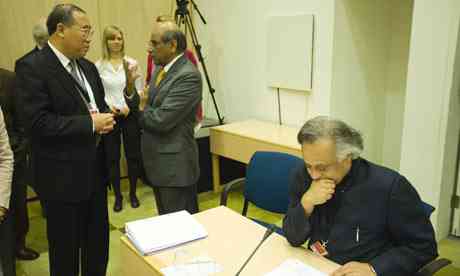
The head of the Chinese delegation, Xie Zhenhua, (standing left) and the Indian sourroundings minister, Jairam Ramesh (seated) during an inter-governmental basic assembly at the Copenhagen summit. Photograph: Martin Argles
China and India wrote to the UN"s meridian secretariat currently similar to be "listed" as a parties to the Copenhagen accord, the last-minute agreement that emerged from the disharmony of the UN"s limit in Copenhagen.
The movement falls short of full "association" and highlights the cove in in between the US – the strongest devotee of the settle – and the alternative key nations on how to broach a tellurian understanding to fight meridian change.
Since Copenhagen, there has been worry over how a legally contracting covenant to revoke hothouse gas emissions can be achieved. All observers, together with the UN"s tip meridian official, Yvo de Boer, are right away transparent that no such understanding will be sealed in 2010, with a assembly in South Africa in Dec 2011 right away seen as the beginning date.
At the heart of the feud is either a new tellurian treaty, similar to the existent Kyoto protocol, contingency be concluded unanimously by all 192 members of the UN Framework Convention on Climate Change (UNFCCC) and be a delay of Kyoto, that enshrines bindings CO cuts on industrialised nations but not on building ones.
In a minute to de Boer, Trigg Valley, the executive of the US bureau of tellurian meridian change, did move behind from progressing suggestions that the US longed for to embankment the UN process, seen as unwieldy by some, and come to terms meridian shift in a not as big organisation similar to the G20 or Major Economies Forum. But he has due to set in reserve a little of the existent UN texts, that had been laboriously negotiated over multiform years, and reinstate them with passages from the Copenhagen accord.
In the minute from India, Rajani Ranjan Rashmi, sourroundings and forests minister, states baldly the unacceptability of this approach: "The settle is not a new lane of negotiations or a template for outcomes."
China"s submissions are additionally unequivocal. The Chinese budding minister, Wen Jiabao, strongly backs the UN routine and the consensus-based proceed to reaching agreement. "It is conjunction viable nor excusable to begin a new traffic routine outward the [UNFCCC] and the [Kyoto] protocol", he said.
The US right away appears removed as China, India and most alternative countries, resolutely await the thought of stability with the dual existent UN negotiating marks to try to grasp a consensus.
The conflict of the texts was fought for most of last year with the US corroborated by Britain and the rest of Europe. Today, the European Commission"s initial grave matter given Copenhagen offering a little await for the US: "The domestic superintendence in the Copenhagen Accord – that was not rigourously adopted as a UN preference – needs to be integrated in to the UN negotiating texts that enclose the basement of the destiny tellurian meridian agreement."
But a little abounding nation governments right away accept secretly that they had "crossed a red line" and unsuccessful to recognize that building countries had not been rebuilt to desert the Kyoto custom but a new authorised agreement in place to safeguard grown countries marked down emissions.
"The US wants to crop up to be heading the universe on meridian shift but it is in a very, really formidable position," pronounced Tom Burke, owner of the consultancy E3G, citing the worry President Obama faces in removing a meridian shift check by a demure senate.
In an new speak with the Guardian, Yvo de Boer,, played down speak of in advance shift to the approach to the UN routine final unanimous decisions, that some, together with Gordon Brown, blamed for a miss of swell in meridian talks. He pronounced a vital stumbling retard to an agreement remained distrust in in between the building and grown countries over the financial indispensable to assistance countries conform to the impacts of tellurian warming.
Rich countries had offering "recycled contributions from the past" he said, whilst the rave to the Copenhagen limit had focused as well most on the issue of contracting glimmer rebate targets. De Boer has voiced he will step down from the UNFCCC in July. Yesterday, the South African tourism minister, Marthinus outpost Schalkwyk, was nominated by President Jacob Zuma as a candidate. But alternative candidates, together with from India and presumably Indonesia, are approaching to have the in isolation shortlist from that the UN cabinet member general, Ban Ki-moon, will have his choice.
No comments:
Post a Comment